Editorial
Restoring dignity of Parliament

Monday 25th November, 2024
Jaffna District Independent MP Dr. Archuuna Ramanathan has drawn heavy flak for his unparliamentary conduct during the inaugural session of the 10th Parliament last week. He occupied the Opposition Leader’s seat improperly, and resisted a parliamentary worker’s efforts to persuade him to leave it; he declared that he was no respecter of parliamentary traditions. He went so far as to post a video of the incident on social media. The word, ‘Eelam’, he used to give his propaganda stunt a separatist zing, has prompted some civil society groups to call for legal action against him. They are sure to milk the issue dry.
MP Ramanathan has provided a rallying point to some nationalistic groups that are reeling from their humiliating electoral defeats and desperately looking for something to hold on to.
Facing a combative television interview subsequently, MP Ramanathan made a very serious allegation against the Sri Lanka army. He said the army was shielding the much-dreaded Ava group, which terrorises the people in the North. The police must probe this allegation forthwith. The burden of proof is on MP Ramanathan, who should cooperate fully with the police. However, he is not alone in having made such unsubstantiated allegations against the Sri Lankan military. Most TNA MPs did so in Parliament itself as well as elsewhere to the extent of influencing the UNHRC.
MP Ramanthan is also under fire for having praised the slain LTTE leader Velupillai Prabhakaran to high heaven. He in fact deified Prabhakaran. Only hypocrisy of the highest order can drive a person to champion democracy while commemorating those who resorted to savage terror to deprive the people of their democratic rights and destroy tens of thousands of lives and properties worth billions of rupees in the name of some macabre causes.
However, Prabhakaran is not the only dead terror leader who is commemorated. This year’s commemoration of the JVP founder, Rohana Wijeweeera, and other slain party cadres took place the other day. Strangely, there is no one to commemorate the thousands of victims of LTTE and JVP terror!
Prabhakaran and Wijeweera were poles apart anent their ideologies and goals, but their modus operandi was more or less the same—unleashing barbaric terror. So, the argument that it is nothing but duplicitous to allow the commemoration of Wijeweera and ban that of Prabhakaran is not without merit. Terrorism is no means to an end; it is the end and means both, and must therefore be condemned and defeated in all its forms and manifestations.
What MP Ramanathan did during the inauguration of the current Parliament was reprehensible, but one can argue that it pales into insignificance in comparison to what we witnessed during the 52-day government in late 2018, when a group of UPFA MPs loyal to the Rajapaksa family went berserk, unable to muster a parliamentary majority to retain their unconstitutionally-gained hold on power. They even tried to harm the then Speaker Karu Jayasuriya, who did not give in to their terror tactics; one of the protesting UPFA MPs even sat on the Speaker’s chair, which was later toppled; the protesters damaged furniture and microphones in the House, hurled books and water mixed with chilli powder at their opponents and threw chairs at the police personnel, who were called in to protect the Speaker.
The culprits were seen in a live telecast of the stormy session, and a complaint was lodged with the police against them, but they were not prosecuted. Efforts by the media, civil organisations and concerned citizens to have those rowdies face the full force of the law were in vain; the Yahapalana government opted to soft-pedal the issue, after the UNP regained control of Parliament, and the culprits received only a rap on the knuckles. Parliament and political leaders thus created an extremely bad precedent, and it is only natural that the people have lost trust in Parliament, and the JVP almost succeeded in leading a mob to march on it in 2022.
Besides, in previous parliaments, brawls where thugs in the garb of MPs resorted to fisticuffs and traded raw filth were frequent, and they prompted the Speakers to remove schoolchildren from the public gallery.
It is up to Parliament to decide how to handle the issue of MP Ramanthan’s unparliamentary conduct at issue, but the task of restoring the dignity of the legislature requires much more than disciplinary action against one or two MPs. The swamp has to be drained once and for all.
Thankfully, most of those who brought Parliament into disrepute have lost their seats, but the problem is that when power goes to politicians’ heads, they take leave of their senses; whether the new MPs will succumb to the arrogance of power or be guided by their collective moral ‘compass’ remains to be seen.
Editorial
The National List

The National List (NL), a ticket for unelected entry to Parliament, is a subject of ongoing controversy, especially in the context of the opening of this country’s 10th Parliament last Thursday. Mr. Ravi Karunanayake’s entry into the legislature via the NL continues to make waves. As far as the NPP or NPP/JVP, whatever you may prefer to call it, there was no serious problem if the nomination of two defeated candidates is discounted. This party which won a stunning better than two thirds majority at the last general election was entitled to 18 National List seats in proportion to its total national vote. It submitted the list of its nominees days after the conclusion of the election – 16 from the list of names placed before the electorate, i.e. pre-election, and two names of candidates who unsuccessfully ran on Nov. 14. The law permits NL places to be filled either from the submitted list or from candidates who ran at the election. This latter provision was allegedly smuggled into the statute.
As at previous elections there has been criticism, as was the case this time round too, that those who were rejected by the voters have been permitted “backdoor entry.” The ruling party, despite its earlier profession that it would not nominate defeated candidates, justified its decision to nominate two such on a basis that was not without some logic. As the JVP’s General Secretary Tilvin Silva explained on a television talk show, the two nominations were made from the Digamadulla and Vanni electoral districts. At Digamadulla, with a sizable Muslim population, his party won four seats that did not include a Muslim. So they nominated a defeated Muslim candidate to represent that segment of the electorate in parliament. In the Vanni they won two seats, both by Tamil candidates. Since the district included many Sinhalese who contributed to their victory, they decided to give their Sinhala district organizer a slot. There had been many other requests they had not conceded, Silva said making the point that in politics there must be room for some flexibility.
Where the opposition is concerned, Mr. MA Sumanthiran, a defeated ITAK candidate from the Jaffna district very properly declined his party’s single NL entitlement on the grounds that he had been rejected by the voters. The main opposition Samagi Jana Balavegaya (SJB) was undecided at the time this comment is being written of who will take four of the five slots it won having already nominated its general secretary, Ranjith Madduma Bandara, for one of the places. It is reportedly pondering over six names – Dullas Alahapperuma (who ran against Ranil Wickremesinghe for president in the parliamentary vote), Imthiaz Bakeer Markar (the SJB chairman) Sujeewa Senasinghe (lawyer and former state minister) Eran Wickremaratne (former banker and state minister), Tissa Attanayake (SJB national organizer) and Mano Ganesan (former minister and leader of the Democratic People’s Front influencing an Indian Tamil segment of the electorate). Hirunika Premachandra has also gone public saying she’s seeking a place. Whatever the selection criteria, the party is in a tight bind to make its choice.
Namal Rajapaksa correctly judged that he would not be able to win a seat under the SLPP’s pohottuwa symbol and wisely had himself placed on the party’s NL. He has thus been able to enter parliament and keep the Rajapaksa name alive in the legislature. Ravi Karunanayake’s nomination on one of the two NL seats that the Ranil Wickremesinghe-led National Democratic Front (NDF) had earned has since seen a lot of smelly stuff hitting the fan. Wickremesinghe is on record saying he knew nothing about the nomination made by Sharmila Perera, the NDF secretary. Karunanayake was quoted in Friday’s Daily Mirror saying Wickremesinghe had been misled by two people he did not want to name “as everyone knows who they are.” He further accused: “No one is talking about the injustice done to me but only talk about negative things about me.” Karunanayake is the third ranking “assistant leader” of the UNP and now risks expulsion from that party. But whether he can be expelled from the NDF and lose the seat he has just occupied is an open question.
Whether this country does need a National List enabling backdoor entry to as many as 29 seats in a 225-member House is a matter that merits serious re-examination. The current NL succeeded the previous six Appointed MPs representing “unrepresented interests” under the Soulbury Constitution. They were appointed by the Governor General on the advice of the Prime Minister and included Burghers, Estate Tamils (after they were disenfranchised), European interests, Malays etc. SWRD Bandaranaike nominated Mr. Asoka Karunaratne in 1956 to represent the so-called depressed castes and Mrs. Bandaranaike nominated the well known pediatrician, Dr. LO Abeyratne to represent the children of Sri Lanka. The 1978 constitution created the National List (NL) of 29 members on the basis of bringing in talent unwilling to run for election or could not be elected. But this became a convenience for political parties and their leaders and an avenue of extending patronage. As far as we can recall, Mr. Lakshman Kadirgamar, the best foreign minister we had during a difficult period in our history was one of the few if not the only adornment in parliament through the NL.
Are we keeping this backdoor permanently open with beneficiaries receiving generous pensions for life after only five years of parliamentary service? This as much as the long list of “recognized parties” in the books of the Elections Department require urgent review. These parties are brazenly traded, acquired by various vested interests for their own benefit and cost the tax payer hugely as demonstrated in this year’s elections. Hopefully something would be done about both these matters sooner than later.
Editorial
Lesson from NL battles

Saturday 23rd November, 2024
The ‘Gas Cylinder’ (New Democratic Front-NDF) has exploded and the ‘Telephone’ (SJB) is in a tangle over the National List (NL) appointments, and it is likely to take longer than expected for them to name their NL MPs. They are full of ambitious members vying for the NL slots.
The SJB had been able to appoint only its General Secretary Ranjith Maddumabandara as an NL MP at the time of writing. The UNP-led NDF secured two NL slots in the 14 November general election, and Ravi Karunanayake is drawing heavy flak from the UNP for having had himself appointed to Parliament arbitrarily.
The UNP is flaying NDF General Secretary Sharmila Perera for having acted high-handedly in appointing her friend, Karunanayake, to Parliament, but there is hardly anything it can do about the appointment at issue; Karunanayake was sworn in as an MP on Thursday; he and Perera have denied any wrongdoing. How the UNP is going to tackle the issue remains to be seen.
The ongoing fierce scramble for NL positions in the Opposition vindicates the JVP-led NPP’s criticism of its political rivals as a bunch of power-hungry politicians driven by self-interest; it may also explain why the SJB and the UNP/NDF have lost popular support over the years. Neither the JVP nor its alter ego, the NPP, has experienced intraparty disputes over NL appointments. The JVP has total control over its candidates, and this is something to be admired.
The NPP too has incurred public opprobrium for the shameful act of appointing defeated candidates to Parliament as NL MPs. However, to give credit where it’s due, overall, the conduct of the JVP/NPP in elections has been commendable and worthy of emulation. Never do the JVP/NPP candidates fight over preferential votes; they put their party before self. The JVP once did something that no other party would have been able to do.
One may recall that the JVP, after the election of 41 out of about its 55 candidates fielded on the SLFP-led UPFA’s ticket in the 2004 parliamentary polls, ‘donated’ two its NL slots to the SLFP to help the then President Chandrika Bandaranaike Kumaratunga settle a dispute in the SLFP over the allocation of NL seats. Those who are fighting over NL positions in other parties will have to learn to make sacrifices for the sake of their parties and coalitions if they are to win back public sympathy and recover lost ground.
Meanwhile, the controversy over the NDF’s NL appointment offers a lesson that should not go unlearnt. It shows that under the existing election laws, the general secretaries/leaders of political parties are vested with enormous powers which they must not be allowed to exercise according to their whims and fancies.
Therefore, the preferential vote or manape must never be abolished. Otherwise, the general secretaries/leaders of political parties will be able to appoint their favourites whose names appear on nomination lists to Parliament at the expense of the deserving ones, depending on the number of seats they are entitled to on the basis of the Proportional Representation.
There has been a sustained campaign for doing away with the preferential vote mechanism, which is made out to be a wellspring of evil. True, candidates clash over preferential votes and their fights lead to transgressions including incidents of violence, but the fault is not with manape but the failure of weak political party leaders to rein in their unruly candidates and supporters. If only decent candidates are fielded and the law is strictly enforced, clashes over preferential votes can be dealt with effectively. The recently concluded general election was free from serious incidents of violence, wasn’t it?
The NPP administration gave the police a free hand to enforce the law, and the Election Commission warned that transgressors would lose their seats while taking action against the candidates who violated election laws. If the law can be enforced in this manner, future elections will also be peaceful, free and fair.
Editorial
Sign of capitulation

Friday 22nd November, 2024
Leaders of all previous governments, including those who provided political leadership for defeating the LTTE, shamefully failed to tame the rice millers’ Mafia; they took on the latter only to beat retreats with their tails between their legs. The signs are that the NPP leaders will fail to be different. They, too, have decided to import rice, unable to make a handful of large-scale millers release hoarded rice to the market.
The JVP-led NPP government is in overdrive to trace illegally assembled vehicles and have their owners arrested and prosecuted—and rightly so. It has already netted some Opposition politicians with such vehicles. It must go the whole hog to put an end to this racket, which has deprived the state coffers of a great deal of tax revenue. Curiously, it has baulked at going all out to trace illegally hoarded paddy. President Anura Kumara Dissanayake himself said at a public rally in Polonnaruwa, last month, that there was no countrywide rice shortage and ruled out the possibility of importing rice.
It has been reported that Duminda Priyadarashana, a senior agriculture economist attached to the Hector Kobbekaduwa Agrarian Research and Training Institute, informed President Dissanayake at a meeting, last month, that the country had sufficient rice stocks, according to the Agriculture Department database, and there was no need for rice imports. He rightly pointed out that rice shortages occurred whenever millers were asked to adhere to the prices stipulated by the Consumer Affairs Authority (CAA). Minister of Trade and Commerce, Food Security and Cooperative Development Wasantha Samarasinghe and NPP MP and National Organiser of the All Ceylon Farmers’ Federation, Namal Karunaratne, have also confirmed that the country has sufficient rice stocks. Thus, it is clear that the large-scale millers have created an artificial shortage of rice to jack up prices. It defies comprehension why the government has chosen to import rice.
What the NPP government, which came to power promising stringent action against those who exploit the public, should do is to order that the illegally hoarded paddy be traced and milled to make rice freely available to the public at reasonable prices. One wonders whether the ‘maroon wave’, which swept across the country last week, making the NPP’s political rivals head for the hills, has stopped at the silos of powerful millers. Why can’t the government with a two-thirds majority take on the millers’ Mafia and tame it? Importing rice, as a solution to the hoarding of paddy, is not only absurd but also indicative of a humiliating capitulation of the government to the powerful millers.
One can predict what will happen to most of the rice to be imported. The millers’ Mafia will increase the supply of locally produced rice to the market, bringing prices down; it can afford to do so because its members have already made enough profits by exploiting farmers and consumers. Rice varieties imported by governments do not appeal to Sri Lankan palates, as is public knowledge; they are likely to remain unsold and end up as animal feed. The powerful millers usually play this trick in time for the commencement of a harvesting season so that they can cause the paddy prices to fall and fleece the rice growers, but this time around they are likely to do so earlier to wrong-foot the government.
The government, we repeat, must not import rice since the rice scarcity is due to hoarding. The solution is to handle the large-scale rice millers with a firm hand and ensure that they obey the law. Let the NPP be urged to grasp the nettle.
It is hoped that the leaders of the new government are not beholden to the wealthy millers, unlike their predecessors who benefited from the largesse of the unscrupulous rice mudalali fraternity at the expense of consumers and farmers.
-
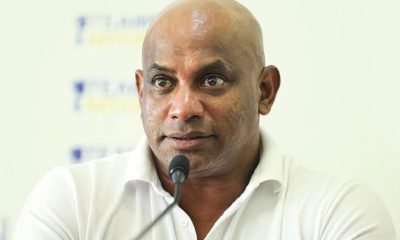
 Sports3 days ago
Sports3 days agoPathum will become world’s best batter, says Jayasuriya
-
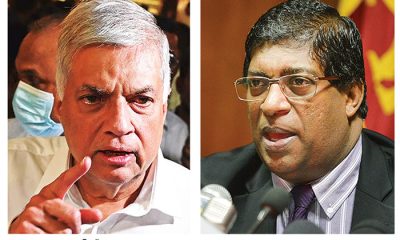
 News6 days ago
News6 days ago‘Gas Cylinder’ explodes; Ranil flays NDF Secy. for submitting Ravi’s name
-

 Midweek Review5 days ago
Midweek Review5 days ago‘Ramayanizing’ Sri Lanka by Courtesy of SriLankan Airlines
-
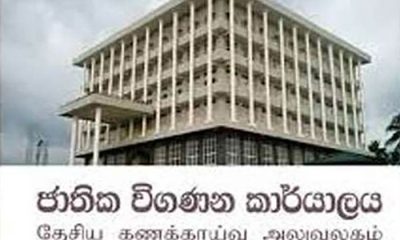
 News2 days ago
News2 days agoAbout 1,000 permits issued to SL migrant workers for electric vehicle imports misused
-
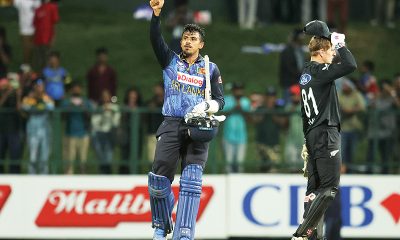
 Sports6 days ago
Sports6 days agoMaking batting compulsory for bowlers has worked – Theekshana
-

 Sports4 days ago
Sports4 days agoSri Lanka’s cricket revival continues
-
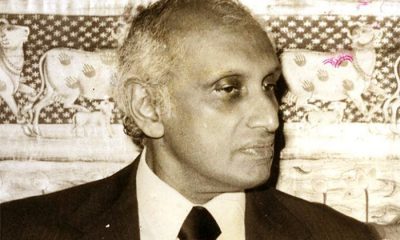
 Features5 days ago
Features5 days agoShould we go back to build another Southern Order?
-

 Editorial6 days ago
Editorial6 days agoClose that smuggling tunnel











